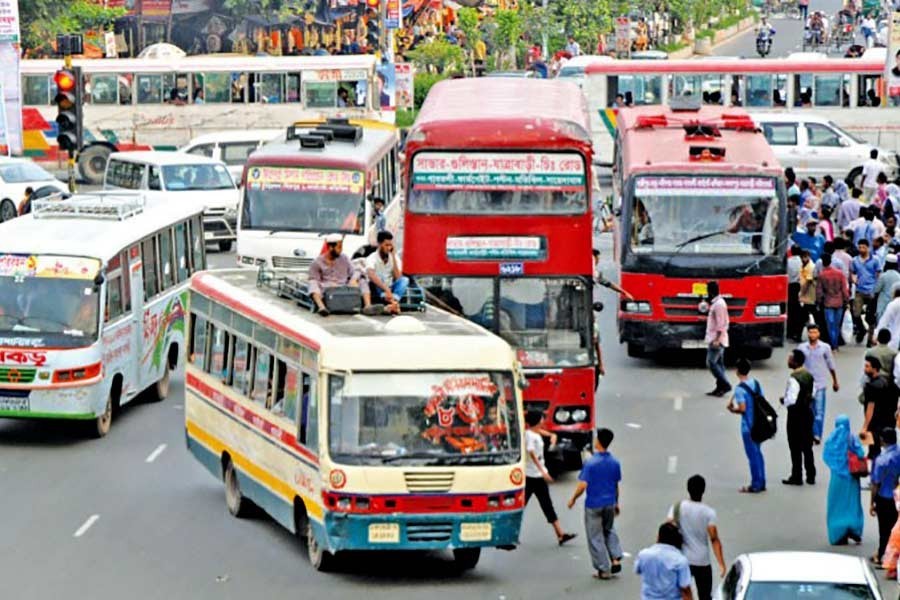There is a mental divide between the public and transport workers. The reason is obvious. Transport workers are mostly painted as villains because of the frequent road accidents -some of which defy every plausible reason and rule in the book. Little do people think of the main culprits behind the prevailing road anarchy and recurrent accidents. It is a consequence of a messy system that has been allowed to continue in the interest of a nexus of greedy transport owners, parasite-like agents and beneficiaries in law enforcement agencies and politics.
In a system like this, the poor transport workers are more sinned than against sinning. This has been confirmed by a research paper of the Bangladesh Institute of Labour Studies (BILS). Its findings show how disgracefully the transport workers are treated and it does not make the nation proud. That workers in the readymade apparel industry have been deprived of what they deserve in terms of wage and duty hours has come to the world community's notice but the more exploited transport workers and their counterparts in the service sector are not lucky enough to draw similar attention.
The BILS findings are very disquieting. As high as 90 per cent of transport workers have no weekly holiday and still a higher percentage of them -98 per cent -does not get the opportunity to enjoy government holidays. Of them more than 50 per cent have to work for more than 15 hours a day. Again 20 per cent of them have to work without any break.
It is a dismal picture that ought to be even more dismal if the nature of employment of transport workers is taken into consideration. They work as daily labourer without any fixed monthly wages. Their income is dependent on the number of trips they make. One of the reasons why there is an insane competition between public buses of the same company for picking passengers at a bus stop is this trip-based wage for drivers and conductors. There is hardly any other benefit. Even during the festivals, most bus companies have no obligation to pay bonuses. The question of insurance coverage does not arise at all if a worker falls sick or is injured or dead. No labour law is at work in the transport sector.
Security staff, hotel and restaurant workers, workers of rerolling mills and employees of private clinics, hospitals and diagnostic centres also have to work for long hours and without holidays but at least they enjoy structured wages. Transport workers and some other workers in the informal sector are the worst sufferers.
In conditions where someone is compelled to overwork and on a regular basis, it is foolish to expect desirable service. It is particularly dangerous for drivers who drive on long routes or even in cities. Realising the stress on drivers, Prime Minister Sheikh Hasina urged all concerned not to compel drivers to drive for more than five to six hours at a stretch. Her unofficial advice has gone totally unheeded.
This points to the fact that there is a need for taking care of transport sector workers and the related matters. First, the daily trip-based wage earning by transport workers has to be abolished. They must draw wages under a rationally framed wage board and be entitled to other benefits approved by the labour law. Owners of transports must be compelled to share the income rationally in order to get rid of exploitation of the poor workers.
At the same time, it has to be ensured that lackadaisical and unfit public transports are taken off the road. If transport operators are forced to run such vehicles, risks of accidents cannot be ruled out. Transport workers have rightly complained that training facilities are next to nothing for drivers to update their skills. If drivers have to work under a system where they have no opportunity to put their skills to regular tests, the task of bringing conductors or helpers under any regulation simply recedes out of sight.
So the problem is not so much with those people on whom depends the running of the sector but an array of hidden factors and parties who create a smokescreen to evade public gaze. Now the need is to look straight into the problems that have been bedevilling the transport sector for long. Regular employment, fair profit sharing, facilities for training of drivers and other transport workers including mechanics and maintenance of transports can bring about the desirable discipline.
However, this can be possible if only the hidden cost in the form of extortion, underhand subscription etcetera can be brought under control. Owners of public transports including trucks used for carrying goods will be able to have more profit at their disposal to share with their employees. Their jobs regularised and without the compulsion of working overtime, drivers and their assistants will be able to give a good account of themselves. It is thus the unwarranted road accidents and tailbacks can as well be brought to the minimum. The need is to take the bull by the horn.


